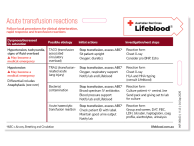Transfusion-associated hypotension
When to suspect this reaction
Hypotensive reaction is defined as isolated fall in systolic blood pressure of 30 mmHg or more occurring during or within one hour of completing transfusion and systolic blood pressure of 80 mmHg mm or less in the absence of allergic or anaphylactic symptoms.
A patient with hypotension may complain of dizziness, headache, feeling unwell or visual changes. Sitting or standing from the bed or chair may result in syncope. This may occur during or after a transfusion.
Hypotension may be detected when performing routine observations and before any other symptoms are seen.
Always consider other potential causes of hypotension including:
- Patient’s underlying condition (unrelated to transfusion, i.e. medications, sepsis, bleeding).
- Anaphylaxis (may present as isolated hypotension)
- Transfusion related acute lung injury (TRALI)
- Transfusion-transmitted bacterial infection
- Acute haemolytic reactions/ ABO incompatibility
Usual causes
Isolated hypotension is rare. The most likely cause is an excess of bradykinin, a vasoactive peptide, particularly where bradykinin metabolism is inhibited, for example, in patients taking ACE inhibitors. Factors that increase concentrations of bradykinin in blood components include storage, leucocyte filtration, and ACE activity in donors and recipients.
Bradykinin causes blood vessels to relax or vasodilate, directly leading to hypotension. In most patients this process is trivial and has no clinical consequences.
Normally ACE rapidly inactivates bradykinin. Patients taking an ACE inhibitor may therefore have a higher risk of transfusion-associated hypotension, although the correlation is unclear.
Investigation
There are no specific investigations for this reaction.
Other reactions that feature hypotension must be excluded.
What to do
Stop the transfusion immediately and do not restart.
Give IV fluids as required.
Follow other steps for managing suspected transfusion reactions.
How to prevent
For patients who may need regular transfusions, consider switching to another class of antihypertensive medication.
Updated June 2025

